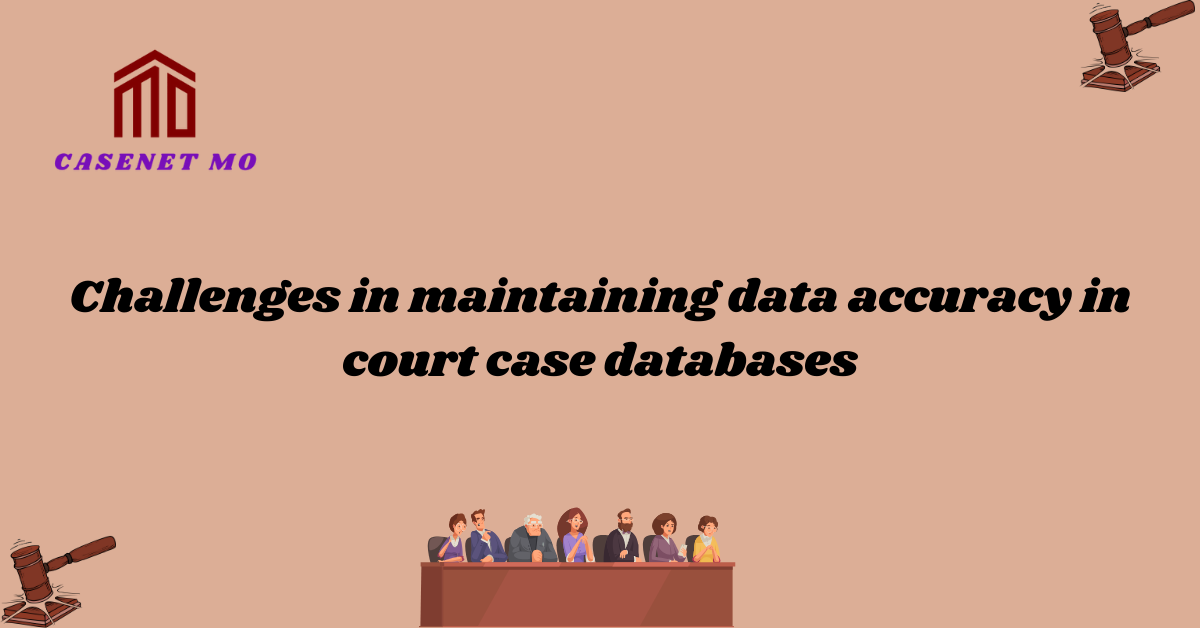Challenges in maintaining data accuracy in court case databases
Ensuring data accuracy is paramount in any field, and the realm of court case databases is no exception. With the vast amount of information that flows in and out of these databases on a daily basis, it becomes crucial to maintain accuracy to uphold the integrity of the justice system. However, challenges persist in this endeavor, as the complexity and volume of data make it difficult to ensure its accuracy.
One of the main challenges in maintaining data accuracy in court case databases is the constant influx of new information. As cases are filed and updated, the database needs to be promptly updated to reflect these changes. This requires a meticulous and efficient process to verify and input accurate data, as any discrepancies or errors can have serious consequences.
Improving Data Verification Processes
One key aspect of ensuring data accuracy in court case databases is the implementation of efficient data verification processes. These processes should involve thorough checks and balances to catch any discrepancies or errors before they are entered into the database. By employing a meticulous approach, the accuracy of the data can be significantly improved.
Utilizing Automated Verification Tools
In order to streamline the data verification process, court case databases can benefit from the use of automated verification tools. These tools can quickly identify potential errors or inconsistencies in the data, allowing for prompt correction and ensuring the accuracy of the information being entered. By leveraging technology, the efficiency and effectiveness of the data verification process can be greatly enhanced.
Implementing Quality Control Measures
Another important aspect of data verification is the implementation of strict quality control measures. This involves setting clear standards for data accuracy and conducting regular audits to ensure compliance. By establishing a robust quality control system, any inaccuracies or errors can be promptly identified and rectified, maintaining the integrity of the court case database.
Integrating Information from Multiple Sources
Integrating information from multiple sources is a complex challenge that requires careful attention to detail. To address this challenge and ensure data accuracy, court case databases should implement a standardized approach to data integration.
Establishing Data Integration Protocols
A crucial step in maintaining data accuracy is the establishment of data integration protocols. These protocols should outline the steps and guidelines for integrating information from different sources, ensuring consistency and accuracy. By adhering to these protocols, the risk of conflicting information or inconsistencies can be minimized, resulting in a more reliable database.
Regularly Updating Integrated Data
Another important aspect of data integration is the regular updating of the integrated data. As new information becomes available, it is essential to promptly update the database to reflect these changes. By establishing a timely and efficient process for updating integrated data, court case databases can ensure the accuracy and relevance of the information they provide.
Investing in Staff Training and Development
To effectively address the challenges posed by maintaining data accuracy in court case databases, it is crucial to invest in the training and development of staff members responsible for data entry and verification.
Providing Comprehensive Training Programs
Court case databases should offer comprehensive training programs to ensure that staff members are well-equipped with the necessary knowledge and skills to maintain data accuracy. These programs should cover topics such as data verification techniques, the use of automated tools, and adherence to data integration protocols. By investing in staff training, court case databases can enhance data accuracy and minimize errors.
Encouraging Continuous Learning and Improvement
Continuous learning and improvement should be encouraged among staff members responsible for data entry and verification. This can be achieved through regular training, workshops, and knowledge-sharing sessions. By fostering a culture of continuous learning, court case databases can stay abreast of best practices and emerging technologies, further enhancing data accuracy.
FAQs
What is the importance of efficient data verification processes?
Efficient data verification processes are crucial in ensuring the accuracy of court case databases. These processes involve thorough checks and balances to catch any discrepancies or errors before they are entered into the database. By employing a meticulous approach, the accuracy of the data can be significantly improved.
Using automation for better data verification?
In order to streamline the data verification process, court case databases can benefit from the use of automated verification tools. These tools can quickly identify potential errors or inconsistencies in the data, allowing for prompt correction and ensuring the accuracy of the information being entered. By leveraging technology, the efficiency and effectiveness of the data verification process can be greatly enhanced.
What makes integrating info from many sources complex?
Integrating information from multiple sources is a complex challenge that requires careful attention to detail. To address this challenge and ensure data accuracy, court case databases should implement a standardized approach to data integration.
What are data integration protocols and why are they important?
Data integration protocols are crucial in maintaining data accuracy. These protocols outline the steps and guidelines for integrating information from different sources, ensuring consistency and accuracy. By adhering to these protocols, the risk of conflicting information or inconsistencies can be minimized, resulting in a more reliable database.
What topics should staff training cover?
Court case databases should offer comprehensive training programs to ensure that staff members are well-equipped with the necessary knowledge and skills to maintain data accuracy. These programs should cover topics such as data verification techniques, use of automated tools, and adherence to data integration protocols. By investing in staff training, court case databases can enhance data accuracy and minimize errors.
How to foster ongoing growth in staff?
Continuous learning and improvement should be encouraged among staff members responsible for data entry and verification. This can be achieved through regular trainings, workshops, and knowledge-sharing sessions. By fostering a culture of continuous learning, court case databases can stay abreast of best practices and emerging technologies, further enhancing data accuracy.







